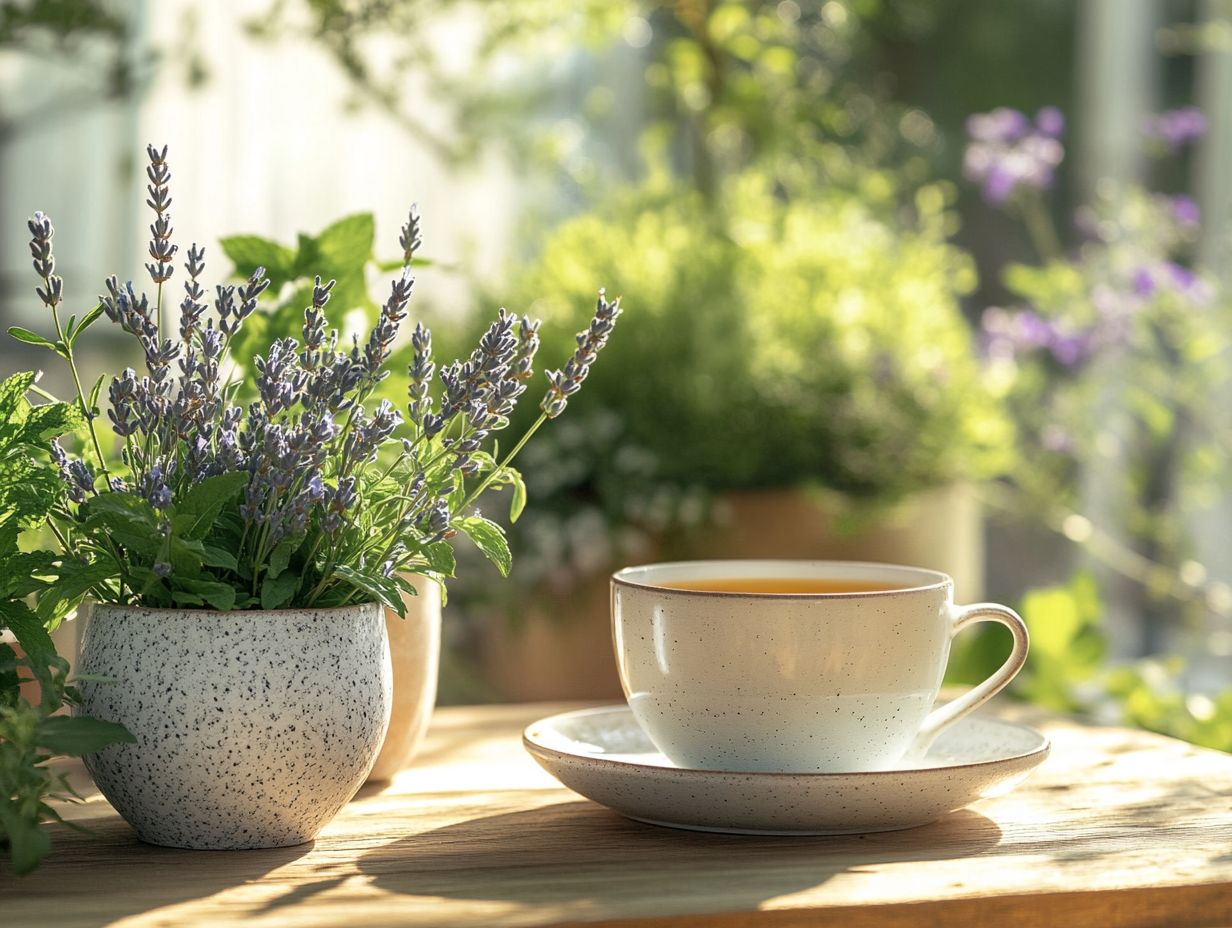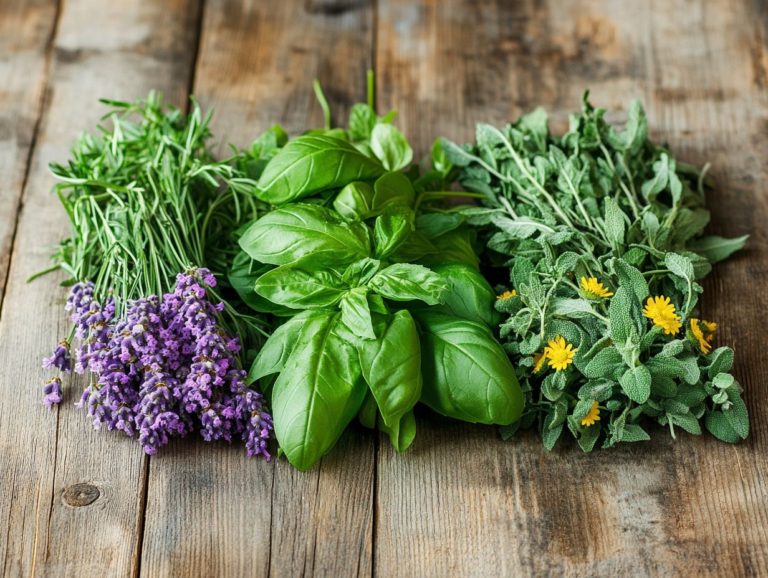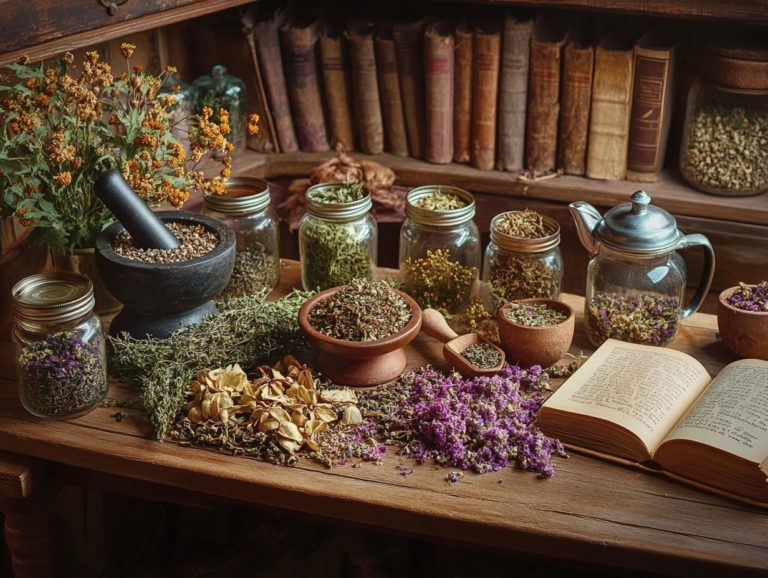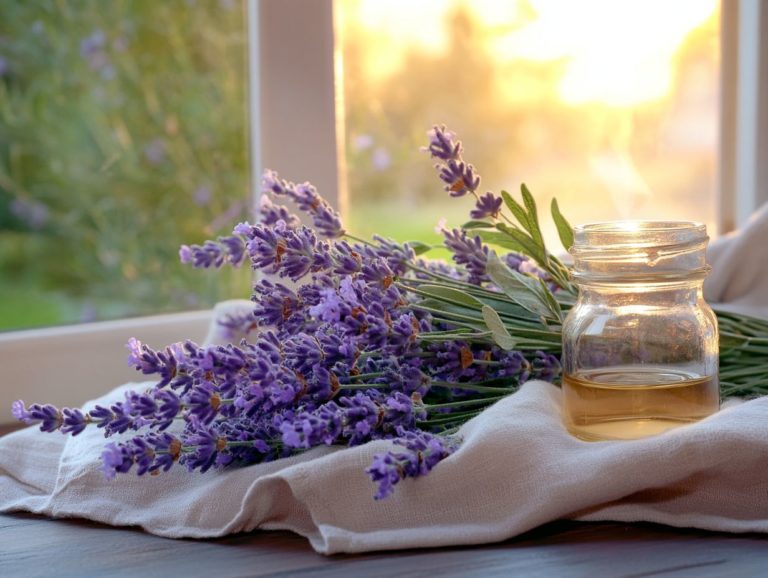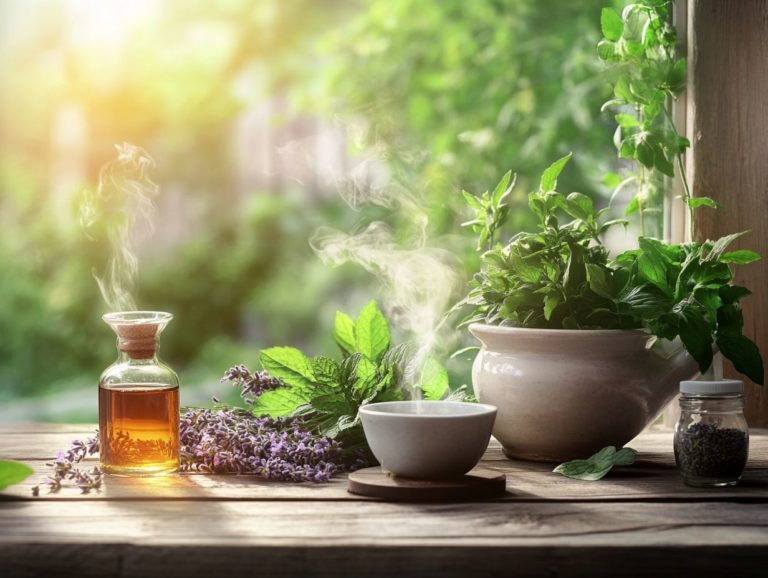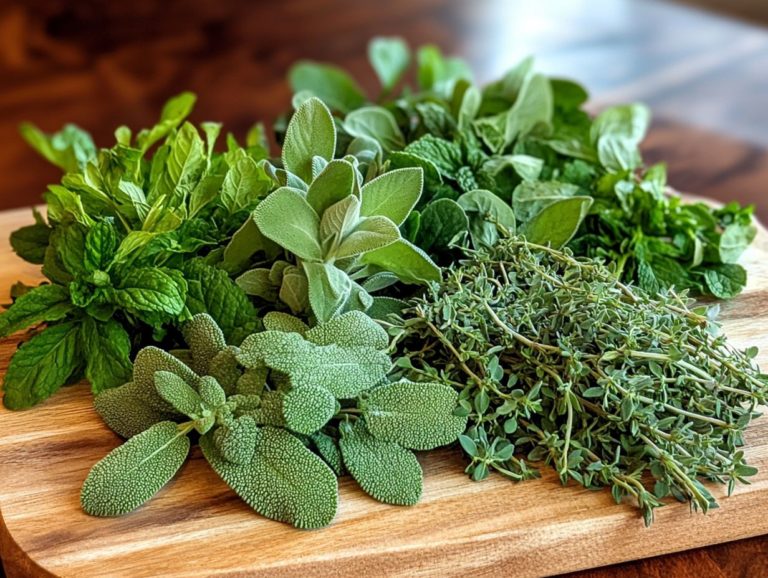5 Best Herbal Remedies for Stress Management
In today s fast-paced world, it s no surprise that stress has become an all-too-familiar companion, impacting your mental and physical well-being. Start your journey to a stress-free life today!
As you seek effective ways to manage stress, herbal remedies have emerged as a favored choice. They provide natural solutions without the unwelcome side effects often associated with conventional medications.
This article delves into five powerful herbs Chamomile, Ashwagandha, Lavender, Valerian Root, and Lemon Balm that can help soothe your mind and promote relaxation. You ll discover their benefits, potential side effects, and how to seamlessly weave them into your daily routine.
Join in as you uncover the natural path to stress relief. Don’t wait to feel better incorporate these herbs into your life now!
Contents
- Key Takeaways:
- 1. Chamomile
- 2. Ashwagandha
- 3. Lavender
- 4. Valerian Root
- 5. Lemon Balm
- What Is Stress and How Does It Affect the Body?
- What Are the Benefits of Using Herbal Remedies for Stress Management?
- How Do These Herbs Help with Stress Management?
- What Are the Different Forms of These Herbal Remedies?
- Are There Any Side Effects or Risks to Using Herbal Remedies for Stress Management?
- How Can One Incorporate These Herbal Remedies into Their Daily Routine?
- Lifestyle Changes for Stress Relief
- Limitations of Herbal Remedies for Stress Management
- Combining Herbal Remedies with Other Medications
- How Long Does It Take to See Results from Using Herbal Remedies for Stress Management?
- Frequently Asked Questions
Key Takeaways:
Incorporating herbal remedies like chamomile, ashwagandha, lavender, valerian root, and lemon balm can help manage stress and its effects on the body. For more insights, check out these naturopathic tips for stress relief. These herbs have been shown to reduce stress, improve mood, and promote relaxation.
It is important to consult with a healthcare professional before using herbal remedies. Additionally, make lifestyle changes like practicing mindfulness and getting regular exercise for optimal stress management results.
1. Chamomile
Chamomile, a time-honored herbal remedy, has been your ally for centuries in promoting emotional health and alleviating anxiety. It’s a favored choice in natural stress management practices.
This soothing herb isn’t just known for its calming effects; it also offers various benefits that can enhance your overall well-being and support your digestive system.
Understanding chamomile’s healing benefits helps you treat anxiety effectively through dietary and herbal supplements tailored to your unique needs.
Historically, chamomile has been cherished for its gentle ability to calm the mind and reduce stress. It is often brewed as a tea to help you unwind after a long day.
Its active compounds, like apigenin, interact with specific receptors in your brain, promoting relaxation and enhancing sleep quality. While chamomile is generally safe for most, be mindful that potential side effects, such as allergic reactions or drowsiness, may arise especially when combined with other sedatives.
Consider combining chamomile with herbs like valerian or passionflower to amplify its calming effects. This blend of herbs offers a tranquil path to emotional well-being.
2. Ashwagandha
Ashwagandha is known as an adaptogen, which means it helps the body manage stress. This celebrated herb stands out for its remarkable ability to combat chronic stress and enhance your immune system.
With a rich history rooted in Ayurvedic medicine, this powerful herb offers a holistic approach to bolstering mental health and overall well-being.
Many individuals incorporate Ashwagandha into their anxiety treatment regimens, tapping into its potential to promote emotional balance and resilience. This ancient herb has been revered for its calming effects, effectively regulating cortisol levels and fostering a sense of tranquility amidst life’s challenges.
Research indicates that integrating Ashwagandha into your daily routine can support stress relief and enhance immune function, giving your body the power to fend off illness more effectively.
Typically recommended in doses of 300 to 600 mg of standardized extract daily, it s wise to consult with a healthcare provider to determine the right amount tailored to your needs.
Whether taken as a supplement or blended with other herbal allies like Rhodiola or holy basil, Ashwagandha s adaptogenic properties can create a synergistic effect, enriching your approach to stress management even further.
Explore these herbs and discover the relief they can bring to your life!
3. Lavender
Lavender is celebrated for its calming scent and is a cornerstone of herbal remedies. It frequently finds its way into aromatherapy, serving as a powerful ally for stress management and emotional well-being.
Its soothing properties are renowned for reducing anxiety and promoting relaxation. This creates a serene environment perfect for emotional healing.
By weaving lavender into your daily routine, you can unlock its remarkable benefits for mental health and overall wellness. This versatile plant is available in various forms, such as essential oils, dried flowers, and herbal teas, each offering distinct pathways to stress relief.
Essential oils can be diffused or applied topically for immediate calming effects. Lavender tea serves as a warm, soothing beverage that gently eases the mind before sleep.
However, remain mindful of potential risks, including allergic reactions in some individuals and interactions with specific medications.
To incorporate lavender effectively, establish a calming bedtime ritual with a cup of tea or spritz a lavender-scented pillow spray. This enhances relaxation and ensures a restorative night s sleep.
4. Valerian Root
Looking for a natural way to sleep better? Valerian root is a highly regarded herbal supplement that helps you sleep and reduces anxiety.
This extraordinary herb has been used for centuries to promote restful sleep and alleviate tension, enhancing emotional health and overall well-being.
Valerian works by modulating neurotransmitters (brain chemicals that affect mood) in the brain, fostering calmness and providing significant relief for those dealing with chronic stress or insomnia.
While valerian is generally well-tolerated, some individuals might experience mild side effects like headaches or digestive issues.
To seamlessly integrate this herb into your routine, start with a tincture or capsule about 30 minutes before bedtime. Pair valerian with other calming herbs like chamomile or passionflower to amplify its effects!
5. Lemon Balm
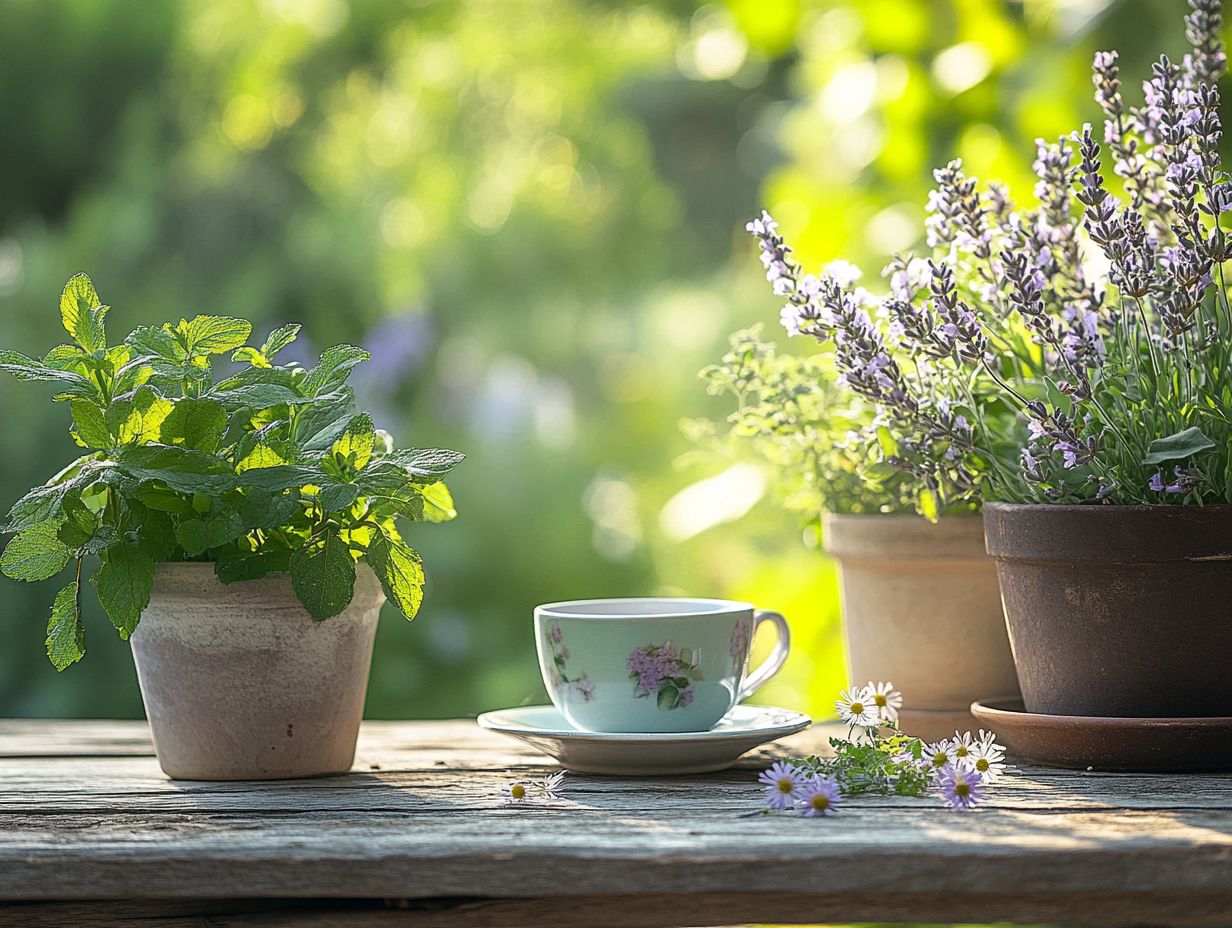
Lemon balm, an aromatic herb from the mint family, is highly valued for its soothing properties. It s effective for managing stress and anxiety, making it a worthy addition to your holistic health regimen.
Renowned for promoting emotional well-being and calming the nervous system, lemon balm is a favorite for those seeking natural solutions to alleviate chronic stress.
Add lemon balm to your routine today for a powerful boost to your mental health! You can find it in teas, tinctures, and capsules, allowing you to choose the method that suits you best.
In addition to its calming effects, this remarkable herb can enhance cognitive function, especially when combined with other remedies like chamomile or valerian root.
While lemon balm is generally considered safe, some individuals might experience mild side effects such as stomach upset or drowsiness. Consult with a healthcare professional before adding it to your routine.
Given its potential benefits, lemon balm is a fantastic herb for anyone looking to improve their mental well-being and manage stress naturally.
What Is Stress and How Does It Affect the Body?
Stress is a complex response of the body’s and mind’s reaction that arises when you perceive a challenge or threat. Its effects on your body can be significant, contributing to chronic stress and a range of health issues related to mental health, immune function, and digestion.
While this adaptive response can be beneficial in short bursts, excessive or persistent stress can lead to negative consequences. Understanding how stress works is crucial for exploring effective herbal remedies and lifestyle changes aimed at managing it.
When you first encounter stress, your body reacts by releasing hormones like adrenaline and cortisol, gearing you up for a ‘fight or flight’ response. However, chronic stress can manifest in symptoms such as anxiety, depression, and fatigue.
The continuous activation of this stress response can wear you down, leading to problems like high blood pressure and a weakened immune system. Recognizing the connection between chronic stress and mental health concerns highlights the importance of seeking alternative management strategies.
Herbal remedies, like ashwagandha and chamomile tea, have gained attention for their potential to alleviate stress, and incorporating energy healing techniques for stress relief can further help you achieve a more balanced state of well-being.
What Are the Benefits of Using Herbal Remedies for Stress Management?
The benefits of using herbal remedies for stress management are impressive. They offer enhanced emotional health, improved mental clarity, and a natural way to tackle anxiety through various dietary and herbal supplements. In addition to these options, consider exploring 5 reasons to try acupuncture for stress management, which can also help relieve stress symptoms and foster overall wellness and resilience against life’s daily challenges.
By exploring the wide array of herbal choices available, you can customize your stress management strategies to meet your unique needs.
- Take chamomile, for example it’s renowned for its calming properties, making it the go-to choice when you’re looking to unwind after a hectic day.
- Then there’s ashwagandha, which has garnered attention for its adaptogenic effects. Adaptogens are natural substances that help your body manage stress and lower cortisol levels.
- Don’t overlook lavender, often favored in aromatherapy for its soothing scent that can assist with sleep and relaxation.
Each of these herbs brings its own distinct benefits, giving you the power to craft a personalized approach to enhancing your mental health and reducing stress in your everyday life.
How Do These Herbs Help with Stress Management?
Herbs like chamomile, ashwagandha, and valerian root are essential allies in your stress management toolkit. These adaptogens enhance your body s ability to cope with stressors. They often work harmoniously with techniques such as cognitive behavioral therapy (CBT), a type of talk therapy that helps you manage your problems by changing the way you think and behave, to create a well-rounded approach to anxiety treatment.
Not only do these herbal remedies provide immediate relief, but they also offer long-term benefits for your emotional health and resilience. By understanding how these herbs function, you empower yourself to make informed choices on your wellness journey.
The adaptogenic properties of these herbs help regulate your adrenal response to stress, balancing hormones and alleviating feelings of anxiety. For example, ashwagandha is renowned for its ability to lower cortisol levels the hormone that spikes during stressful moments thereby fostering a sense of calm.
Chamomile, on the other hand, provides relaxing effects that can significantly improve your sleep quality, laying the groundwork for enhanced mental clarity and emotional balance.
When you incorporate these natural aids alongside cognitive behavioral therapy, you can amplify your therapeutic outcomes. This fosters a more receptive mental state that enables you to engage more effectively in your healing process.
Discover how simple herbs to relieve stress and anxiety can transform your stress management! Try these remedies today to feel the difference!
What Are the Different Forms of These Herbal Remedies?
Discover the vibrant world of herbal remedies! Herbal remedies come in a delightful array of forms think dietary supplements, calming teas, strong liquid extracts, and invigorating essential oils. Each offers its own unique benefits and methods of administration for managing stress and enhancing emotional health.
By understanding these different forms, you can select options that best suit your needs, whether you find solace in a soothing cup of tea or prefer the convenience of a supplement. The versatility of herbal remedies ensures that there s a perfect method for everyone.
Take, for example, teas. They are often cherished for their calming effects and can seamlessly fit into your daily routine.
Tinctures, on the other hand, are concentrated liquid extracts that allow for quicker absorption, making them ideal for those in search of strong results.
Essential oils bring another dimension, as they can be used in aromatherapy or applied topically, offering both therapeutic benefits and a sensory experience.
When selecting the right form for yourself, consider factors like your lifestyle, taste preferences, and specific health goals. Some may lean toward the ritualistic pleasure of brewing tea, while others might prioritize the efficiency that supplements provide in their busy lives.
Your journey toward improved well-being with herbal remedies can be both personalized and enjoyable.
Are There Any Side Effects or Risks to Using Herbal Remedies for Stress Management?
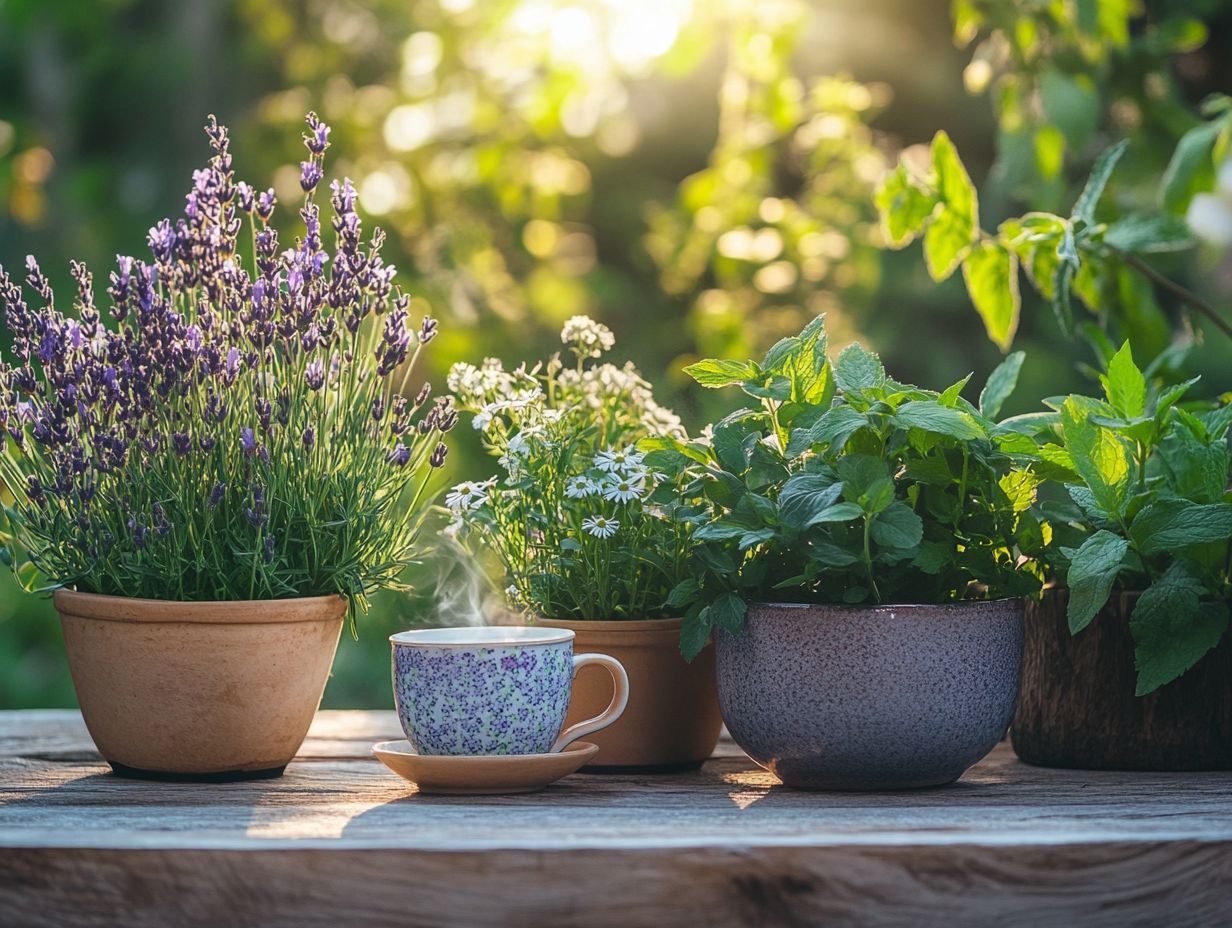
While herbal remedies can offer a wealth of benefits for managing stress, it’s crucial to recognize the potential side effects and risks that come along, especially when it pertains to anxiety treatment and herbal supplements.
You might experience adverse reactions, and some herbs can interact with medications, highlighting the importance of making informed decisions as you incorporate these natural remedies into your wellness routine. Understanding these risks gives you the power to use herbal remedies safely and effectively.
Take St. John’s Wort, for example; it can interfere with antidepressants or birth control pills, leading to unintended consequences.
You may also find yourself dealing with side effects like gastrointestinal upset, dizziness, or allergies when using certain herbal products.
Prioritizing safety is crucial. Consulting your healthcare provider is vital, especially if you have underlying health conditions or are already on medications. Responsible consumption is key to fostering a holistic approach to wellness, allowing you to enhance the benefits of herbal remedies and achieve a harmonious integration into your health regimen.
How Can One Incorporate These Herbal Remedies into Their Daily Routine?
Imagine sipping calming chamomile tea before bed! Incorporating herbal remedies into your daily routine can serve as a seamless and effective strategy for enhancing stress management and emotional health, allowing you to tap into the natural benefits of these time-honored solutions.
Whether it s through soothing teas, essential oils in aromatherapy, or dietary supplements, these herbs can effortlessly blend into your lifestyle, promoting overall wellness and resilience against stress.
By mindfully integrating these remedies, you can maximize their advantages for optimal health outcomes.
To truly harness the potential of these herbal options, it s vital to consider specific dosages and timing. For example, enjoying a calming chamomile tea before bedtime can facilitate relaxation, while herbs that help your body adapt to stress, like ashwagandha, might be best taken in the morning to help you manage stress throughout the day.
Combining these remedies with practices such as deep breathing or yoga can further amplify their effectiveness. Remember, consistency is essential; regularly incorporating these practices can lead to significant improvements in your emotional well-being over time, establishing a solid foundation for effective stress management.
Start exploring the world of herbal remedies today for a healthier, stress-free life!
Lifestyle Changes for Stress Relief
Making lifestyle changes can significantly improve your stress management and emotional health. This approach creates a holistic strategy to tackle anxiety and stress-related issues.
Integrate regular exercise, mindfulness practices, and cognitive behavioral therapy a therapy that helps you change negative thinking patterns into your routine! These strategies beautifully complement the benefits of herbal supplements, giving you a well-rounded toolkit for enhancing your mental health and overall well-being.
By adopting these lifestyle changes, you ll build a stronger, more balanced mind! Activities like walking, yoga, or sports not only boost your physical fitness but also release endorphins that elevate your mood.
Mindfulness techniques, such as meditation and deep breathing, ground your thoughts and alleviate feelings of being overwhelmed. Maintaining consistent sleep hygiene allows your body to recover and rejuvenate.
A nutrient-rich diet packed with essential vitamins and minerals nurtures brain health, supporting emotional stability. When these changes are paired with herbal remedies, the synergy can lead to remarkable improvements in managing stress. Explore these methods today for a happier, healthier you!
Limitations of Herbal Remedies for Stress Management
While herbal remedies can be powerful tools in your stress management journey, it’s crucial to recognize their limitations. For a more comprehensive approach, consider exploring naturopathy for stress management, as these methods aren’t a one-size-fits-all solution for everyone facing anxiety or mental health challenges.
Individual responses to herbs vary widely, and some situations may call for a more comprehensive treatment approach, like cognitive behavioral therapy or professional medical intervention. By acknowledging these nuances, you can make informed choices about your health and wellness.
Be aware that certain herbal supplements might interact with other medications, potentially causing unintended side effects or reduced effectiveness. For example, if you’re dealing with chronic anxiety, combining herbal treatments with structured therapy can be particularly beneficial, especially during times of severe emotional distress.
Remember, while herbs can offer soothing effects, they shouldn t replace professional diagnosis and treatment for mental health disorders. If anxiety starts to interfere with your daily life, seeking specialized guidance is vital for achieving lasting relief and holistic well-being.
Combining Herbal Remedies with Other Medications
The question of whether you can safely combine herbal remedies with other medications is essential! Certain herbs may interact with pharmaceutical drugs, so understanding potential interactions and contraindications is vital for your safety and the effectiveness of those remedies.
It s highly advisable to consult with a healthcare professional before starting any new herbal regimen.
Take St. John’s Wort, for instance. While it’s popular for its mood-enhancing properties, it can significantly reduce the effectiveness of various medications, including antidepressants and birth control pills. Similarly, kava, known for its calming effects, may pose risks like liver toxicity when mixed with certain prescriptions.
To navigate these complexities, keep an open line of communication with your healthcare provider! Maintain a comprehensive list of all the supplements and medications you re taking to help identify potential interactions and lead to safer, more effective treatment plans.
Approaching herbal use with caution and respect for both traditional practices and modern medicine is truly the way to go!
How Long Does It Take to See Results from Using Herbal Remedies for Stress Management?
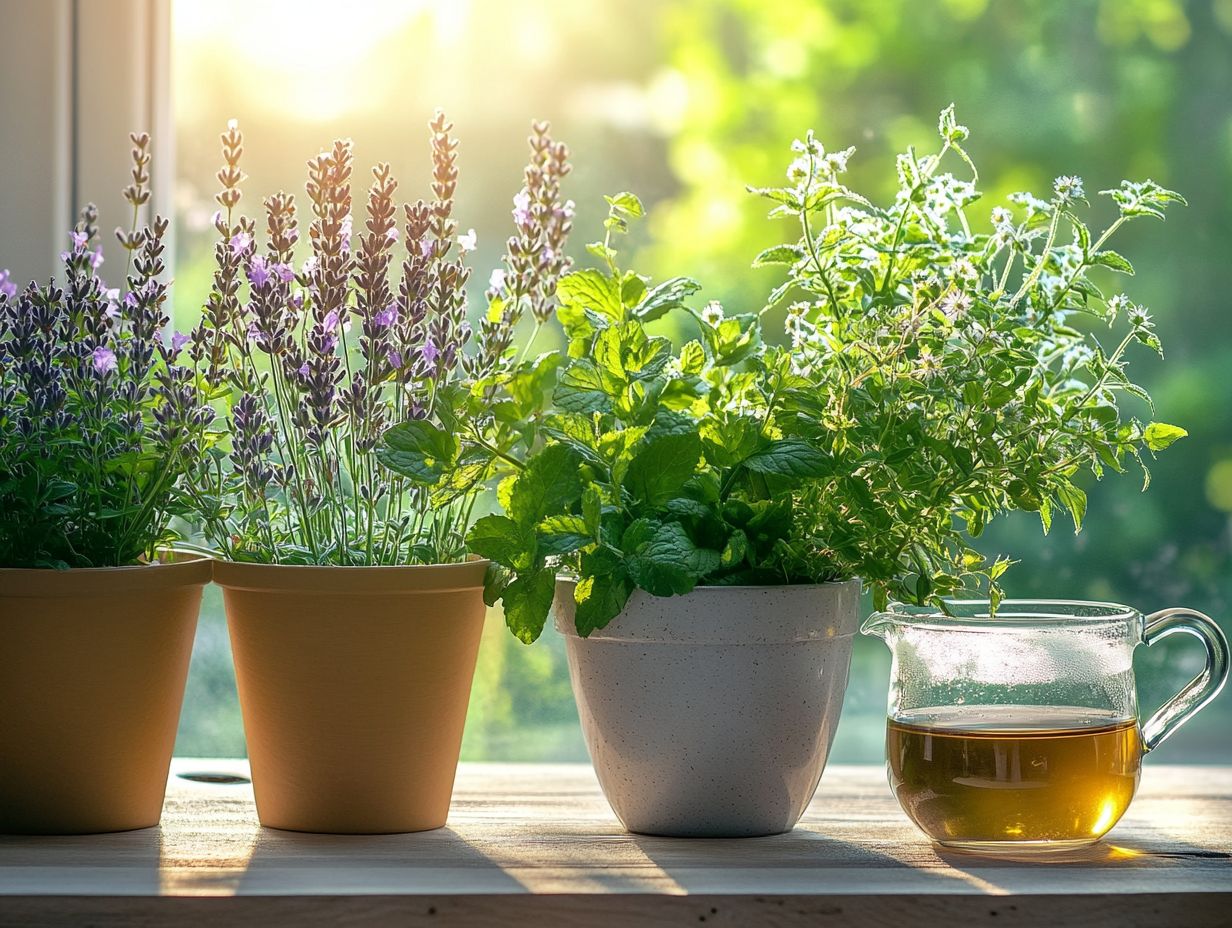
Discover how quickly you can feel better! The timeline for witnessing results from herbal remedies for stress management can vary significantly. It depends on factors such as the type of herb used, dosage, and the specific mental health challenges you’re addressing.
While you might find immediate relief with anxiety-busting herbs like valerian, others may require several weeks before you notice substantial changes in your emotional well-being and stress levels. Understanding these timelines allows you to set realistic expectations as you incorporate herbal remedies into your routine.
Many users discover that consistency and patience are essential ingredients for success.
For instance, milder herbs like chamomile or ashwagandha may necessitate a longer commitment to yield noticeable effects. Your lifestyle factors like diet, exercise, and existing stress management practices also play a crucial role in how quickly you experience the benefits of these remedies.
By embracing a holistic approach and maintaining a steady routine, you can significantly enhance your chances of achieving the emotional balance and stress relief you desire.
Frequently Asked Questions
What are the 5 best herbal remedies for stress management?
The 5 best herbal remedies for stress management are ashwagandha, lavender, chamomile, lemon balm, and valerian root, and you can learn more about them in our guide on herbal remedies for stress relief.
How does ashwagandha help with stress management?
Ashwagandha is a herb that helps the body handle stress and reduce cortisol levels, making it an effective herbal remedy for stress management.
What are the benefits of using lavender for stress management?
Lavender has a calming effect on the mind and body, promotes relaxation, and can help improve sleep, making it a great herbal remedy for stress management.
Can chamomile really help with stress?
Chamomile has been used for centuries to promote relaxation and reduce anxiety, making it a natural and effective herbal remedy for stress management. For those looking to explore more options, check out the best herbal remedies for fatigue.
How does lemon balm work as a stress management herbal remedy?
Lemon balm has a calming effect on the nervous system and can help reduce stress and anxiety while promoting relaxation.
Is valerian root a safe and effective herbal remedy for stress management?
Yes, valerian root has been used for centuries to reduce stress and promote relaxation, but it is important to consult with a healthcare professional before using it.
Start your journey to stress relief today with these amazing herbs!

